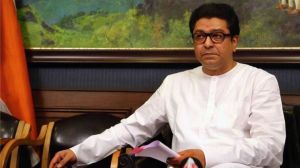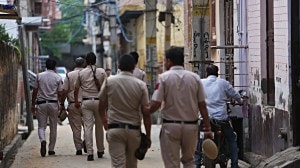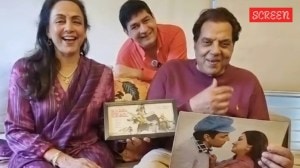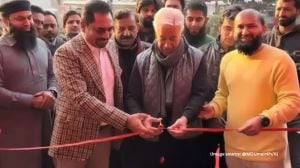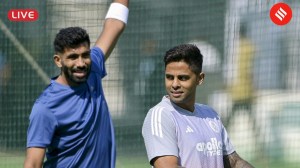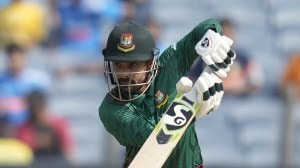Monson Wedding
THE most-wanted tag just got attached to a piece of paper. Among intelligence agencies, the Mumbai Crime Branch and the media, the buzz all ...

THE most-wanted tag just got attached to a piece of paper. Among intelligence agencies, the Mumbai Crime Branch and the media, the buzz all centres around the official invitation to Dawood Ibrahim8217;s daughter Mahrooq8217;s nikaah with Javed Miandad8217;s son Junaid.
But in the inner circle8212;and that includes a select few of Mumbai8217;s senior policemen8212;there8217;s a healthy dose of scepticism over the alleged wedding date. 8216;8216;It8217;s quite possible that the wedding has already happened. And July 9 is being mentioned just to throw everyone off the scent,8217;8217; say erstwhile aides at Temkar Street and Pakmodia Street in Nagpada, where Dawood lived. 8216;8216;It would be highly uncharacteristic of Bhai to announce the date like this, he8217;s such a private man.8217;8217;
Senior Mumbai policemen agree, suggesting that the marriage took place way back in April and that the families were choosing to make the liaison public when it suited them.
There8217;s similar confusion over the venue for the wedding. While some reports indicated the ceremony would be held in Mecca8212;Anis Ibrahim8217;s daughter, too, got married in the holy city8212;others hint at a Karachi wedding and a Dubai reception.
ALL of which goes to indicate Dawood Ibrahim hasn8217;t lost his touch, not yet. 8216;8216;He lived here at Pakmodia Street for months on end, and made it a point to be as inconspicuous as possible,8217;8217; says a former member of the D Company.
And this was in the late-1970s, when Dawood wasn8217;t even a quarter of the global terrorist he is branded today, when 8216;D8217; was just the fourth letter of the English alphabet and bomb blasts were still alien to the streets of Bombay.
8216;8216;In those days, all wedding cards in the Nagpada-Dongri area began the same way: 8216;With best compliments from Ibrahim CIDwale and family8217;. The parents8217; names came later,8217;8217; remembers one of the oldest residents of Temkar Street.
| nbsp; | After the 1993 blasts, Dawood fled India, leaving behind property worth crores. 8216;But their value is nothing compared to his own wealth.8217; |
Ibrahim CIDwale was a constable at a CID unit, and locally known to be a heavy gambler. His eldest sons Sabir and Dawood were gulli ke gunde, supplying muscle power for petty crimes. Yet, in a strangely prescient way, locals thrilled to be in their good books. 8216;8216;Their protection meant no one could touch them, they were blessed by Ibrahim and his family,8217;8217; concludes the old-timer.
Interestingly, it was Sabir who had the reputation of being violent and notorious; Dawood was known to be a talent scout. With their father8217;s CID job gaining him access to sensitive information, the sons were always in the hub of illegal activities.
8216;8216;Ibrahim Kaskar knew every inch of Bombay and was aware of every criminal activity of every gang around the 1970s,8217;8217; says an old police superior. 8216;8216;It was Ibrahim who actually helped Dawood build his brand. He introduced him to most of the big names in crime and also introduced his son to a number of officers,8217;8217; add sources close to the D company.
THIRTY years down the line, Temkar Street might not know who Abba is, but in the 1970s, it meant only one man. 8216;8216;And anybody calling him Chacha was immediately labelled an outsider,8217;8217; says an old familiar. 8216;8216;Abba was the last word, the decision-maker, till the day he died. Not even Dawood would dare to defy him.8217;8217;
In return, Abba passed on his networking skills and his intelligence to his third-born. 8216;8216;Abba was so smart that after Sabir and Dawood began acquiring a reputation, he dropped their names from his ration card to show he had no connection with them,8217;8217; says a contemporary. 8216;8216;Of course, he never took his eyes off their work.8217;8217;
If the street-smarts was what he inherited from his father, his mother8217;s legacy was her soft-spoken nature. 8216;8216;Unlike Sabir and Anis, Dawood was always well-mannered and soft-spoken,8217;8217; says a Pakmodia Street resident. 8216;8216;His mother used to read the namaz five times a day and would hardly be seen outside. She was always spotted in a tantura and was respected by all residents of Nagpada and Dongri.8217;8217;
The story goes that after Ibrahim8217;s death, Amina Bi took on her husband8217;s mentor mantle. 8216;8216;I remember a property dispute even the High Court could not settle. The complainants finally met Ammi and the matter was sorted out in two days,8217;8217; says a resident of Temkar Street. 8216;8216;In fact, it8217;s she who would have been the happiest at the news of Mahrooq8217;s wedding. Most of the cases that came to Ammi related to divorce, which she strongly opposed.8217;8217;
WEDDINGS in the Kaskar family have always made news. Sabir, who was the first to get married, reportedly had the entire Bombay underworld as his guestlist.
8216;8216;It was one of the most tense days for the city police. The wedding took place opposite the Nagpada Police Hospital. Ibrahim Kaskar was summoned to the headquarters, where he had to give his word that nothing outrageous would happen,8217;8217; says a senior officer. 8216;8216;Even then, every policeman must have prayed against being posted at Nagpada on that day.8217;8217;
Dawood8217;s wedding, in comparison, was a much smaller affair, but the history is as colourful.
8216;8216;This was the time Samath Khan, Karim Lala8217;s son, was creating a lot of trouble for the gangs. Every gang head wanted him killed,8217;8217; says an ex-member of a rival gang.
8216;8216;Then Samath was killed in a planned encounter, 100 bullets were pumped into him. Even after he had collapsed, Dawood went up to check if he was actually dead. Once the death was confirmed, he made the first call to his mother, telling her he was ready to get married.8217;8217;
The venue was the matchbox-sized Kaskar family house on Pakmodia Street. 8216;8216;It was attended only by very close associates,8217;8217; says one of them.
8216;8216;Of course, it8217;s another matter that after midnight quite a few political big-wigs and Customs officials stopped by.8217;8217;
THAT man8217;s daughter is getting married. And if there8217;s consensus on who won8217;t be there, it8217;s the father of the bride.
|
1 Eldest sister Sayeeda. Drowned in Mumka, Ratnagiri in 1983. Her son Sajid 35 runs the Maharashtra Guest House at Memonwada, Mumbai, and has been booked under the Maharashtra Prevention of Dangerous Activities of Slumlords, Bootleggers, Drug Traffickers Act. His current whereabouts are not known
2 Elder brother Sabir. Killed in a shoot-out by the Pathan gang in 1981. Survived by a son and daughter who now live with Dawood in Karachi. After his death, wife Shenaz disassociated herself from the clan
3 Younger sister Haseena Parkar. Widowed after her husband Ibrahim Parkar was killed in shoot-out by the Gawli gang in 1992. Resides at Nagpada
4 Younger sister Zaitun. Wife of Hamid Antulay aka Bhai Jhan and mother of two sons and two daughters. Based in Dubai, sole agents of Manikchand gutka in the Gulf region
5 Younger brother Noora. Based in Karachi. First wife died of burn injuries and left behind two children. Married again and has two more children
6 Younger brother Iqbal. Married to Rizwana and has two sons and a daughter. Now in Arthur road Jail. Prosecuted by the Mumbai Police crime branch for his involvement in Sara-Sahara shopping complex case
8 Younger sister Farhana. Wife of Saud Tungekar and mother of two sons and a daughter. Residents of Bandra in Mumbai
9 Younger sister Mumtaz. Wife of Rahim Abdul Faki and mother of a son and a daughter. Based in Karachi
10 Younger brother Mustaqeem. Married to the daughter of Haji Ittefad Hussain who runs hotels in Mumbai. Father of two sons and a daughter. Based in Karachi
11 Youngest brother Humayun. Married in 1994-95 to a daughter of Mumbai-based Yusuf Kashmiri, also Dawood8217;s father-in-law
Guests to watch out for
Mumbai will see an exodus for the Dawood wedding. Or will it?
Consider Dawood8217;s younger brother Anis Ibrahim. He was in Dubai when his elder brother Iqbal Kaskar, Ibrahim and Amina Kaskar8217;s seventh-born, was scheduled to tie the knot in 1985. Anis was wanted in India, but he threw caution to the winds to travel to Mumbai and attend the wedding.
It8217;s another matter that the Directorate of Revenue Intelligence formed the reception committee at the airport and took Anis into custody almost as soon as he landed. It would be three more years before Anis got bail in a bunch of police cases; almost immediately, he jumped bail and flew back to Dubai.
As they say in Bollywood: Bhai ho to aisa!
THERE8217;S no reason to think that the inner circle of Dawood8217;s family does not continue to be as fanatically loyal as Anis. They just don8217;t talk about it, especially to the media.
Once-upon-a-time associates of the D Company say the omerta was issued by Dawood himself. And no one, not even classmates from the Ahmed Sailor High School in Nagpada, where Dawood once studied, are willing to flout it. After all, whoever wants to attract attention to connection with the man even the United States considers a dangerous terrorist?
So sister Haseena Parkar, born just after Dawood, continues to live quietly in Nagpada, South Mumbai. Her husband Ibrahim Parkar was allegedly killed to avenge the death of Bapu, brother of Arun Gawli now an MLA from Mumbai. The flat on the first floor of the Gordon Hall complex is just a stone8217;s throw away from the Nagpada police station.
Enquiries for 8216;8216;Haseena aapa8217;8217; draw blank stares from the security guards at the gate. But a quick look-see at the name-board reveals H I Parkar lives in A-12.
The doorbell is answered by a middle-aged woman with an unwelcoming face. 8216;8216;Aapa nahin hai8230; abhi niche gaye hayen Aapa isn8217;t in8230; she8217;s gone downstairs,8217;8217; she says in the most practised manner. The business card is swallowed up in her hand.
Forty-five minutes later, another shot at the doorbell elicits a younger woman. 8216;8216;Nahin hain, kab aayegi pata nahin She8217;s not in, don8217;t know when she8217;ll be back,8217;8217; she blurts out even before any questions can be put to her. Just before the door closes though, a domineering voice floats through, inquiring half-heartedly about the visitor.
The last time8212;perhaps the only time8212;Hasina aapa was sighted by the media was during the December 2004 wedding of her son Danish in Mumbai. The myth remains alive.
AHMED Chacha might be a common enough name, but in Nagpada it bears the air of exclusivity. It belongs to Dawood8217;s uncle, who runs a small office under the banner of the Bharatiya Minority Suraksha Mahasangh on Sir J J Road.
The fanatical family loyalty is evident here as well: The signboard acknowledges the founder of the organisation to be Haji Mastan Mirza. It8217;s said to be under the first-generation don8217;s tutelage that Dawood grew proficient at disposing of smuggled goods.
Anyone unfamiliar trying to enter the office8212;the glass door stands open8212;is intercepted by a young man hanging around on the pavement outside. He asks what they want, why they need to go inside, and then goes and confers with a man sitting just beyond the door.
8216;8216;Ahmed Chacha does not want to meet you. Please leave your card and he8217;ll give you a call,8217;8217; he says apologetically. The glass door swings shut.
The promised call, of course, never comes.
ALSO on the ex-Mumbai guest list is Dawood sister Farhana, who lives in Bandra with her husband Saud Tungekar and their two sons and a daughter. Tungekar has had a slight run-in with the law a while ago: He was booked for extortion by the Azad Maidan police station, but the case fell through when the complainant, a shipping company, withdrew the charge.
Whatever. Tungekar today runs an international scrap business with the blessings of his highly influential brother-in-law.
While the whereabouts of Sajid8212;Dawood8217;s deceased eldest sister Sayeeda8217;s son once booked under the Maharashtra Prevention of Dangerous Activities MPDA Act8212;are unknown, Dawood8217;s father-in-law Yusuf Kashmiri and youngest sibling Humayun are known to have shifted base from Dongri in South Mumbai to Versova in the north-western suburbs after the 1993 Bombay blasts.
In 1995, Kashmiri reportedly spent four months in Karachi, getting a daughter married to Humayun. Will he be there this time too? The answer8217;s likely to be in affirmative, but no one8217;s taking bets on his not being tailed.
A SURE shot family presence at the Junaid-Mahrooq wedding is Mustaqeem, the 11th member of the present generation of Kaskars, who is already in Karachi. His father-in-law Haji Ittefad Hussain runs two hotels in Santa Cruz in Mumbai, while brother-in-law Shamim Bhaiya is a Mumbai police approver in the Manikchand Dhariwal gutka case. Father and son, incidentally, don8217;t get along, but neither are likely to be at the wedding: the Haji is not in the city at the moment, while Shamim is in CBI custody.
AND then there are the others, family members who will not make up the wedding party for reasons not too hard to fathom. Uncle Mehmood Kaskar and his family, who live at Chakla in Pydhonie, for instance, do not seem to have the cash-and-kind bond that Dawood shares with other members of his family. It8217;s unlikely they8217;ll be flying west anytime soon.
And then there8217;s Iqbal. The seventh son of Ibrahim and Amina is currently languishing in the anda isolated cell at the Arthur Road prison. Last heard, he had an array of 25 SIM cards. He may just be passing on his blessings digitally.
The real deal
8216;8216;Not all the properties are Dawood8217;s. They all just get linked to him if his associates have a stake in them. Bhai isn8217;t really bothered about them8212;their value is nothing compared to his own wealth,8217;8217; say sources close to the D Company. 8216;8216;But he continues to be clued into all movements in Mumbai real estate. He is aware of every important inch of land that gets sold.8217;8217;
The ball that started it all
That match, say veteran cricket-watchers, is when Dawood Ibrahim realised that cricket was more than a game of bat and ball played by 22 men in white; it was a game thousands of punters8212;and several sharp bookies8212;could play.
Why was that six so vital? Until that match, in the Australasia Cup, India were perennial winners at the venue. They were reigning World Cup champions and had, the previous year, also won the Benson and Hedges Cup in Australia. Pakistan were very much the underdogs; they had the numbers on their side at Sharjah8217;s claustrophobic stadium but not the wins.
| nbsp; | April 18, 1986 Miandad8217;s last-ball six helped Dawood realise that cricket was more than a game played by 22 men in white; it was a game thousands of punters8212;and several sharp bookies8212;could play |
So it was pretty inconceivable to the average viewer that Miandad could hit those winning runs, that India could lose. Perfect conditions for laying odds, then. Cricketing folklore has it that the six which turned the tide for the Pakistanis brought the underworld betting syndicate 8216;8216;profits that couldn8217;t be wiped out for years8217;8217;.
This isn8217;t to say that the climax was fixed. 8216;8216;That last-ball six off Sharma couldn8217;t have been fixed. Such shots cannot be planned and neither did Chetan Sharma plan a full toss. It was just a bad day for India,8217;8217; says a player who was a part of that team.
Yet this is probably when Dawood and Miandad took the first step in a relationship being cemented now.
One journalist who was present at the match recalls the events that followed. 8216;8216;Javed walked out of the stadium with six suitcases. He also got a car and, presumably, several other expensive gifts. At the airport the officials were so busy clicking photographs that none of Miandad8217;s bags were checked.8217;8217;
That is also when the 8216;8216;F8217;8217; word started being heard, though in hushed tones. 8216;8216;Until then,8217;8217; says the journalist, 8216;8216;no one had any inkling that matches could be fixed. It was only after that series and the kind of money that players received8212;whether in victory or defeat8212;that things started to become suspicious.8217;8217;
Later, Dawood became one of the most distinguished guests at the stadium in Sharjah, no longer a secret, no longer under wraps but the cynosure of all eyes, the magnet for all stars whether of the sporting of filmi kinds.
What was the exact relationship? Well, several months ago, former BCCI secretary Jaywant Lele made this statement to the media: 8216;8216;Dawood visited the Indian dressing room once in Sharjah and offered every player a Toyota car if they managed to win the game.8217;8217;
No one is sure whether that8217;s the truth or not; no cricketer contacted by this reporter was willing to speak on the issue, or any related issue. India no longer play at Sharjah, the International Cricket Council has tightened up security around cricketers8212;and Dawood himself isn8217;t around anymore.
You8217;d never have imagined it just a few years ago.
- 01
- 02
- 03
- 04
- 05








